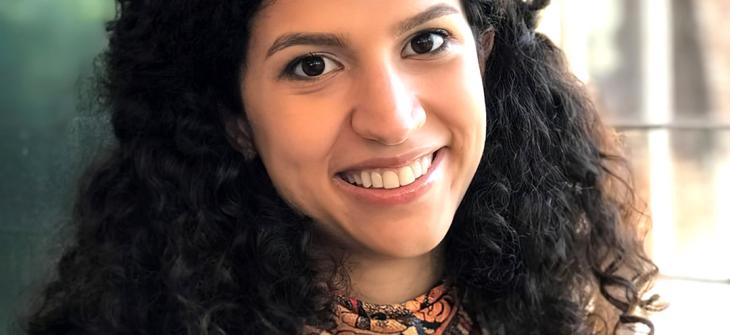Hashemi Awarded 2021-2022 Bloomberg Data Science PhD Fellowship
Content

February 16, 2022
Helia Hashemi, a doctoral student at the Manning College of Information and Computer Sciences (CICS) at UMass Amherst, is one of nine early-career researchers to receive the 2021-2022 Bloomberg Data Science PhD Fellowship. The fellowship provides financial support for doctoral students in an effort to encourage the production of publications in academic journals and conference proceedings, application development, open-source contributions, and other forms of research dissemination as part of Bloomberg's larger efforts to engage the academic research community.
Hashemi's proposal, "Far-flung Representation Learning for Search and Recommendation," presents her research on advancing the quality of information retrieval (IR) through the introduction of a general framework for learning multiple widely distributed representations of a query in search and recommendation engines.
Query representation learning, in which models learn from query representations of user preferences, is one of the core tasks of IR. Current models learn only a single representation for each query, but it is a well-established problem that a single query may stem from multiple and divergent user needs. For example, when a user searches for "migraine," they may be looking for general information about this medical condition, or about its symptoms or treatments, or even statistics related to the condition. Additionally, single representations for queries face limitations in handling ambiguous queries, and in tracking user preferences across multiple domains.
Hashemi proposes a new general framework in which models can learn multiple representations of an information need formulated by the user with a query string, thereby increasing the quality of results. "The framework uses an asynchronous training mechanism for efficient training," Hashemi explains. "While one process clusters query-related documents with similar representations, the second process generates intent descriptions from each cluster." She expects that this framework will introduce a number of research directions related to the task of far-flung representation learning.
Each selected fellow is engaged in research directly related to Bloomberg's ongoing areas of interest and is chosen by a committee of Bloomberg data scientists. The fellows are also supported through mentorship, career counseling, and research internships. "Being a Bloomberg PhD Fellow gives me an opportunity to collaborate with researchers at Bloomberg and oversee the applications of my research in real-world systems. This will greatly improve the impact of my research," says Hashemi.
Hashemi, advised by CICS Distinguished University Professor Emeritus W. Bruce Croft at the Center for Intelligent Information Retrieval, researches information retrieval, machine learning, and natural language processing, with a recent focus on conversational information seeking and neural representation learning for information retrieval.
For more information about Hashemi and the 2021-2022 class of Bloomberg Data Science PhD Fellows, see: https://www.techatbloomberg.com/blog/announcing-bloomberg-data-science-ph-d-fellowship-winners-2021-2022.